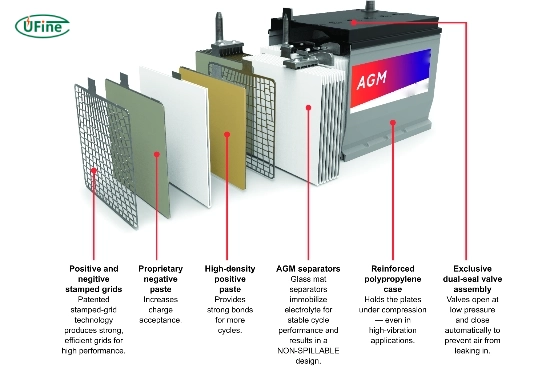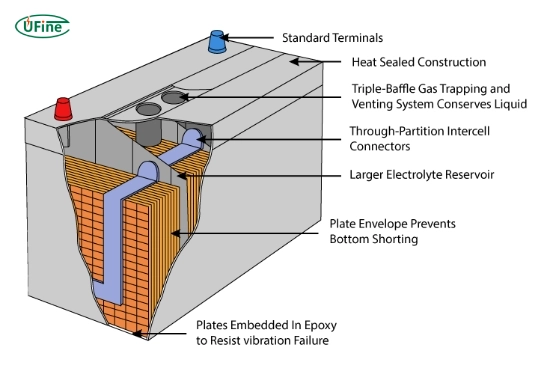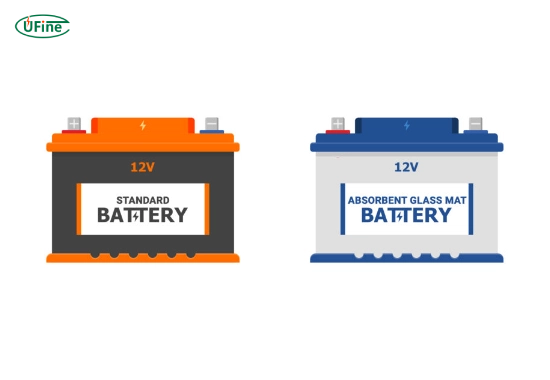
- Part 1. What is an AGM battery?
- Part 2. What is a regular battery?
- Part 3. AGM battery vs regular battery: How do they differ?
- Part 4. Advantages and disadvantages of AGM and regular batteries
- Part 5. AGM battery vs regular battery: Which battery is better for specific applications?
- Part 6. AGM battery vs regular battery: How do you maintain each type of battery?
- Part 7. FAQs
When choosing the right battery for your needs, understanding the differences between an AGM battery and a regular battery is crucial. Each type offers unique features, benefits, and applications that can significantly impact your choice. This article will delve into the characteristics of AGM and regular batteries, helping you decide based on your specific requirements.
Part 1. What is an AGM battery?
AGM batteries are lead-acid batteries that utilize a fiberglass mat to absorb the electrolyte. This design seals the battery, making it spill-proof and maintenance-free. AGM batteries are known for delivering high currents on demand, which makes them ideal for applications requiring quick bursts of power.
Key Features of AGM Batteries
- Sealed Design: Sealed AGM batteries prevent electrolyte leakage.
- Low Self-Discharge Rate: Their rate is low, meaning they can hold their charge for extended periods when not in use.
- Vibration Resistance: The solid construction of AGM batteries makes them resistant to vibration and shock.
- Fast Charging: They can be charged more quickly than regular batteries.
Part 2. What is a regular battery?
Regular batteries, often called flooded lead-acid batteries, consist of lead plates submerged in a liquid electrolyte solution. These batteries are widely used in various applications, from automotive to renewable energy systems. While generally more affordable than AGM batteries, they have certain limitations.
Key Features of Regular Batteries
- Liquid Electrolyte: Regular batteries use a liquid electrolyte that requires maintenance and periodic topping-off.
- Higher Capacity: They typically have a higher energy storage capacity than AGM batteries of similar sizes.
- Cost-Effective: Regular batteries tend to be cheaper upfront than AGM options.
Part 3. AGM battery vs regular battery: How do they differ?
Understanding the differences between AGM and regular batteries is essential for making an informed choice. Here’s a detailed comparison of their key characteristics:
- Construction: AGM batteries use absorbed glass mats to hold the electrolyte, while regular batteries have liquid electrolytes that can spill.
- Maintenance: AGM batteries are maintenance-free due to their sealed design, whereas regular batteries require periodic checks and topping off electrolyte levels.
- Lifespan: AGM batteries typically have a longer lifespan (3–5 years) than regular flooded lead-acid batteries (2–4 years).
- Weight: AGM batteries are generally lighter than regular batteries due to their compact design.
- Cost: AGM batteries usually have a higher price than regular flooded lead-acid options.
| Feature | AGM Battery | Regular Battery |
|---|---|---|
| Maintenance | Maintenance-free | Requires regular maintenance |
| Lifespan | Longer lifespan | Shorter lifespan |
| Weight | Lighter | Heavier |
| Cost | Generally more expensive | More affordable |
| Discharge Rate | Low self-discharge | Higher self-discharge |
| Charge Time | Faster charging | Slower charging |
Part 4. Advantages and disadvantages of AGM and regular batteries
Advantages of AGM Batteries
AGM batteries offer several advantages that make them suitable for specific applications:
- Safety: The sealed design minimizes the risk of acid spills and gas emissions, making them safer for indoor use.
- Durability: Their resistance to vibrations and shocks makes them ideal for off-road vehicles or marine applications.
- Performance: AGM batteries can deliver high bursts of power, which is beneficial for starting engines or powering high-drain devices.
Disadvantages of AGM Batteries
Despite their many benefits, AGM batteries also have some drawbacks:
- Cost: They are generally more expensive than regular flooded lead-acid batteries.
- Temperature Sensitivity: AGM batteries can be sensitive to extreme temperatures, affecting their performance.
Advantages of Regular Batteries
Regular flooded lead-acid batteries also have their own set of advantages:
- Affordability: They are typically less expensive than AGM options, making them accessible for budget-conscious consumers.
- Higher Capacity Options: Regular batteries often provide higher capacity options for large-scale energy storage needs.
Disadvantages of Regular Batteries
Regular batteries come with notable disadvantages:
- Maintenance Required: They need regular maintenance, including checking electrolyte levels and cleaning terminals.
- Shorter Lifespan: Flooded lead-acid batteries generally have a shorter lifespan than AGM counterparts.
Part 5. AGM battery vs regular battery: Which battery is better for specific applications?
Choosing between an AGM battery and a regular battery often depends on your specific needs:
- For Automotive Use: An AGM battery may be preferable due to its performance capabilities if you need a battery that can provide quick bursts of power (like starting an engine).
- For Solar Energy Systems: Regular flooded lead-acid batteries might be more cost-effective if you require high capacity and don’t mind performing maintenance regularly.
- For Marine Applications: An AGM battery is often recommended due to its resistance to vibration and spills.
Part 6. AGM battery vs regular battery: How do you maintain each type of battery?
Proper maintenance is essential for maximizing the lifespan and performance of both types of batteries:
Maintenance Tips for AGM Batteries
- Keep terminals clean and free from corrosion.
- Store in a cool, dry place away from direct sunlight.
- Avoid deep discharges whenever possible; recharge promptly after use.
Maintenance Tips for Regular Batteries
- Check electrolyte levels regularly and top off with distilled water as needed.
- Clean terminals with a mixture of baking soda and water to prevent corrosion.
- Ensure proper ventilation during charging to prevent gas buildup.
Part 7. FAQs
-
What is the main difference between AGM and regular batteries?
The main difference is their construction; AGM batteries use absorbed glass mats, while regular batteries use liquid electrolytes. -
Are AGM batteries worth the extra cost?
If you need safety, durability, and quick charging capabilities, you can justify the investment in an AGM battery. -
Can I use an AGM battery in place of a regular battery?
Generally, yes, but ensure your device or vehicle supports the specifications required by an AGM battery. -
How long do AGM and regular batteries last?
With proper care, AGM batteries typically last 3–5 years or more, during regular flooded lead-acid batteries usually last 2–4 years. -
Which type of battery is better for deep cycling?
AGM batteries are better suited for deep cycling due to their lower self-discharge rate and ability to handle frequent discharges without damage.
Related Tags:
More Articles

What are Watts and Watt Hours in Battery?
Understand watt vs watt-hour in batteries, how to calculate battery watt hours, and what Wh means for car batteries, devices, and energy storage.
A Complete Guide to the Best Batteries for Flashlights
Compare the best batteries for flashlights, including AA, AAA, 18650, 21700, CR123A. See which battery offers the best brightness, runtime, and reliability.
How Long Do Rechargeable AA Batteries Last?
How long do rechargeable AA batteries last? Compare NiMH and lithium AA lifespan, recharge cycles, key factors, and performance vs alkaline batteries.
How Much Current Can a 9V Battery Really Supply?
Discover how many amps a 9V battery can supply, its actual current output, discharge rate, and capacity for alkaline, lithium, and rechargeable 9V batteries.
12V STD vs 12V AGM: Meaning, Differences, and Which Is Better
Understand what STD and AGM batteries mean, their key differences, and which 12V battery fits your needs best in 2026.





